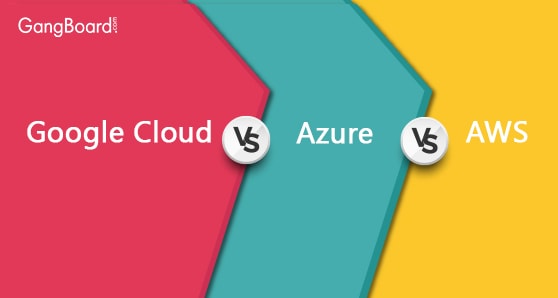
AWS Vs Azure Vs Google Cloud
AWS Vs Azure Vs Google Cloud
The most on-going clash nowadays is between AWS, Azure and Google cloud. Let us discuss them all and then find their basic differences.
What is AWS?
AWS or Amazon Web Services is a wide-ranging, progressing cloud computing platform that is being provided by Amazon. It delivers a combination of cloud services viz. IaaS, PaaS and SaaS.
AWS sprung in 2006 from the inner organization that Amazon.com put together to manage its trade operations online. AWS was the first company to present a pay-as-you-go computing model of cloud that provides users with storage and throughput as desirable.
AWS comprises many implements and services intended to benefit users take applications, servers, database and data onto public cloud. The Migration Hub offers a site to monitor migrations from different locations to the cloud. Amazon’s partnerships exist with numerous technology sellers that simplify hybrid cloud distributions. An admin handles and tracks cloud store configuration using AWS Configuration Rules. These help an IT team to evade inadequately organized and in essentially costly cloud resource distributions.
Features of AWS
Mobile Friendly Access:
Its Mobile Hub provides besides leading you in the direction of appropriate plus harmonious features for your application. It comprises of console to help you access AWS facilities some of which are development, monitoring and testing of the mobile applications.
Cloud function without server:
API and Gateway of Amazon assist users by executing and scaling the code. A user only needs to upload the code using mobile phone. There is no need to be concerned about server as the entire course is accomplished by AWS. For numerous jobs to be completed at once back-end code is required that also runs besides responding to the code.
Databases:
AWS uses various databases for various purposes. For transactions, Internet applications, analytics, real-time tasks, connected data etc. relational, non-relational, data warehouse, in-memory store and graph DB are used respectively.
Storage:
This feature of AWS is flexible, easy to use and economical. This storage could be utilized individually or in combination as per requirements. Different types of storage provided by AWS are glacier for long-term storing, EBS for block level storage etc.
Security:
Security is given at port level and at protocol level. Four fields of security rules in AWS are protocol, type, port range, source etc.
Marketplace:
It provides online stores for customers to look for software and even buy it.
What is Azure?
Azure or Microsoft Azure is a Microsoft creation for cloud computing. It is used for constructing, testing, installing, and handling applications and facilities through Microsoft-managed centers of data. It delivers software as a service i.e. SaaS and platform as a service i.e. PaaS. Infrastructure is delivered as a service known as IaaS besides supports many diverse programming languages, blocks and frameworks, comprising both Microsoft and third-party systems.
Microsoft Azure is correspondingly functioning to construct an end to end stand that can supply to the requirements of its clients. Nevertheless, what you can understand with Azure, in comparison to AWS, is that heritage of Azure innovativeness computing has actually very much promoted them concerning building desired solutions. This also includes creation of EA i.e. Enterprise Agreements. There are around 600 services by Azure.
Some of these are listed below:
Mobile services:
Collecting analytics of real-time users highlights their preferences. It also helps in providing push notifications to the device.
Storage service:
Storage services include storage and retrieval of data on and from the cloud respectively. Programs can store their structured text in portioned groups accessible by primary key.
Data Management:
SQL warehousing is used to manage computational or data queries when database exceeds 1 TB. Azure Data Lake is another scalable storage for data for big-data analysis workloads that require parallel queries.
Event Hub:
It provides event ingress to cloud at large scale with high reliability.
Queues:
They are used for one directional messaging. Sender sends the message to service bus’s queue. Receiver reads from this queue. Multiple readers can be there for the queue but only single process can process the message.
CDN:
It stands for Content delivery network. It is designed for video, audio, images etc. It helps in increasing performance of users.
What is Google Cloud?
Google Cloud is a group of cloud computing public services delivered by Google. It offers facilities for storage, compute, networking, machine learning, big data and the internet of things plus security tools, cloud management and developer tools.
Features of Google Cloud
No need for server management:
Install your code, let Google execute it and it will also scale it. Cloud Functions conceptualizes the entire fundamental substructure, so that your emphasis is on your code. It also helps you to build applications sooner.
Automatic Scaling:
Depending on client needs and number of clients; it scales the facilities and infrastructure.
Extension of services:
Services like GCP, google assistant etc. are connected and extended with code. It helps in shifting from perception to production.
Pay on run:
You only need to pay when your function is running and nothing after it stops running. This is also metered to nearby 100 milliseconds.
Run as per events:
You can run your code from mobile via HTTP or from any web or backend application. You can also run your code from Firebase or google assistant.
Familiarity:
Cloud supports JavaScript, Go and Python code. Due to this no new technology or programming needs to be learnt.
AWS vs Azure Vs Google Cloud
| Feature | AWS | Azure | Google Cloud |
|
Starting year |
It started in 2006. |
It started in 2010. |
It started in 2011. |
|
Main services |
Their services are deployment functions, mobile networking etc. |
Most of its services are in cooperation with AWS. |
Google, YouTube etc. |
|
Selection of one |
If you want IaaS services and want lasting status of company. |
If you want PaaS services and want Windows integration for your company. |
When emphasis is more on analytics with restricted budget. |
|
Market share |
62% |
20% |
12% |
|
Pricing per hour/minute |
Hour |
Minute |
Minute |
Related Blogs
-
What is AWS?
-
What is AWS API Gateway?
-
What is AWS Lambda?
-
What is AWS Management Console?
-
What is AWS EC2 Instances?
-
Azure Vs AWS
-
AWS Certification Cost in India
-
AWS Interview Questions and Answers
-
Microsoft Azure Interview Questions ans Answers
-
Future Trends in Cloud Computing
-
Data science with Cloud Computing


 +1 201-949-7520
+1 201-949-7520 +91-9707 240 250
+91-9707 240 250